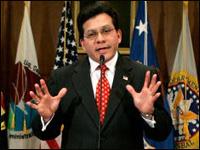Transcript
[RUSH TRANSCRIPT -- UNCORRECTED]
BROOKE GLADSTONE:
One thing that became clear this week is that most of the Justice Department serves at the, quote, "pleasure of the President." Attorney General Gonzales said it.
ATTORNEY GENERAL GONZALES:
I work for the American people and I serve at the pleasure of the President of the United States, and he'll decide whether or not I continue to serve as the Attorney General.
BROOKE GLADSTONE:
We kept hearing it, but what does it really mean? I asked Slate's legal expert and senior editor, Dahlia Lithwick.
DAHLIA LITHWICK:
What it means, in effect, is that under the constitutional structure that we have today, and that we've had for hundreds of years, these are all positions that can be appointed by the executive branch, that the President fills these positions and they serve as long as he likes what they're doing. He could fire them tomorrow, under this theory, for anything – for cause, for no cause, for the color of their hair.
BROOKE GLADSTONE:
I guess the question that is really bothering me is if the President has the right to remove this whole layer of prosecutors, how independent is the judicial branch in the end?
DAHLIA LITHWICK:
The check against all this was never that the President couldn't fire them. The check was that he couldn't put in place new ones in their positions without oversights. The President or the Attorney General could appoint a new one. They could only serve for 120 days, at which point they needed to be confirmed by the Senate. That's your Congressional check.
If the Senate failed to confirm her, that U.S. attorney could not continue to serve, then the district judges in that district would appoint the new U.S. attorney. So then you'd have the judicial branch checking.
Now, that changed because of the part of the scandal that's probably least understood, which is a change in the Patriot Act. The provisions that were sort of snuck into the Patriot Act and that the Congress voted for said, okay, now there's no longer any check. Those people don't just serve 120 days. They serve indefinitely.
BROOKE GLADSTONE:
Okay. So then what do you think of the spin that's been floated by a lot of Republicans and some of the conservative media that the current firings, as The Wall Street Journal said, are business as usual, that the Clintons did it even worse?
DAHLIA LITHWICK:
That particular counter-example is absolutely inapposite, and, I think, unfair. And nobody expects when a new President from an opposing party comes in that all the U.S. attorneys [LAUGHS] would continue to serve, because, as I said, these are political appointments. They go to people whose views comport with yours.
So to say, wait a minute, you know, George Bush only fired 8, Clinton fired 93, is to sort of, I think, lose the point. There's a difference between putting 93 new people in at the beginning of your term and getting rid of eight of them in the middle of their term because you don't like that they're not going after [LAUGHS] Democrats. So it's a very inept, and, I think, unfair comparison.
BROOKE GLADSTONE:
How well do you think the media have done in sort of combing through whether this is normal or not normal?
DAHLIA LITHWICK:
A fairly rotten job, truth be told. I sort of laughingly refer to it as "piece A" or "piece B." Piece A is this sort of indignant, horrified, you know, politics has never tainted the doings of the Justice Department. You know, Gonzales should be impeached, if not shot. That's sort of piece A. And piece B is this sort of, oh, this happens all the time. The Clintons did it even more. You know, it's typical liberal, you know, hysteria to suggest that there's anything new here.
And I think that both of those things sort of distort the reality. And it seems to me that that comparison of, you know, Bush fired 8, Clinton fired 93 is so absolutely irrelevant to the current debate that the fact that we're still having a conversation about those two numbers is really emblematic of the problem of how sort of lazy we've been.
BROOKE GLADSTONE:
All right. Dahlia, thank you so much.
DAHLIA LITHWICK:
My pleasure.
BROOKE GLADSTONE:
Dahlia Lithwick is a senior editor at Slate.
